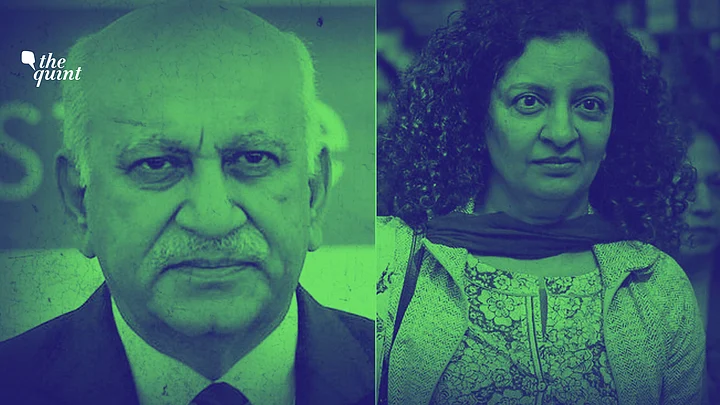The order on whether the defamation case brought on against journalist Priya Ramani by ex-BJP minister MJ Akbar will be transferred out of the Rouse Avenue Court or not will be passed on 22 October, informed district and sessions Judge Sujata Kohli on Wednesday, 14 October.
Citing the top court’s directions, ACMM Vishal Pahuja, had, on Tuesday, 13 October, said that only matters filed against MPs and MLAs can be listed before the Rouse Avenue Court, where the defamation case brought on by MJ Akbar against Journalist Priya Ramani was being heard so far.
Incidentally, MJ Akbar’s lawyer Geeta Luthra was going to give her rebuttal, on Tuesday, to Ramani’s lawyer Rebecca John’s final arguments.
If the case is transferred, it can be expected that the final arguments will have to be made all over again.
WHAT DID THE LAWYERS INVOLVED IN THE CASE SAY?
MJ Akbar’s lawyer Geeta Luthra, on Wednesday, urged the court to not transfer the case, stating that they had neared the end of the case at the Rouse Avenue Court, that Akbar was keen to clear his name soon, and that the court’s time and their efforts over the past two years will be wasted. Further, Luthra submitted that while the Supreme Court’s notification does want cases against MPs and MLAs to be tried by designated courts, it does not bar the courts from trying the cases filed by MPs and MLAs.
Luthra also contended that even the accused’s lawyers want the case to not be transferred out of the Rouse Avenue Court, where it was being tried for two years. However, the counsel of the accused said that they are fine with getting the case transferred because “we are bound by the mandate of the law.”
“So I leave it to your honour to decide,” said Bhavook Chauhan, appearing for the accused.
WHAT DID THE COURT SAY
District and Sessions Judge Sujata Kohli explained that the purpose behind the designated courts is that the cases against MPs and MLAs may be tried expeditiously and if held innocent, their name is cleared. Further, she expressed concerns about all the proceedings in the Akbar-Ramani case getting vitiated, due to incorrect jurisdiction.
However, she also said that she agreed with Akbar’s counsel in that it was a “notification” and not a “legislation” which was coming in their way of finishing the proceedings at the Rouse Avenue Court itself.
MORE DETAILS
The Supreme Court reportedly passed directions regarding expeditious disposal of cases against MPs and MLAs by designated courts, earlier in September.
Originally, however, the Supreme Court had in 2017 itself issued directions in Ashwani Kumar Upadhyay vs UOI, to facilitate early disposal of cases against MPs and MLAs. These were reflected in a circular dated 23 February 2018, of the Delhi HC.
The defamation case against journalist Priya Ramani was brought on by MJ Akbar in 2018.
Rebecca John, appearing for Ramani, had already concluded her final arguments in the case, on 19 September.
BACKGROUND
In a 2017 article about sexual predators at workplace, written for Vogue, Ramani had described her own ordeal of having been sexually harassed by a former boss. A year later, in the wake of the #MeToo Movement, Ramani had alleged on social media that the former boss had, in fact, been Akbar.
Akbar had subsequently filed a criminal defamation case against Ramani, asserting that Ramani’s allegations were false and that it had cost him his “stellar reputation”.
In her final arguments, John had pointed out that Ramani had pleaded “truth” as her defence, “made in good faith, in public interest, and for public good”, and had gone on to cite exceptions 1 and 9 interlinked with exception 3 to Section 499 of the Indian Penal Code.
She had also said that Rebecca John had said that Priya Ramani was being “targeted selectively” to halt the avalanche of allegations against Akbar, and addressed claims of his “impeccable reputation”.
